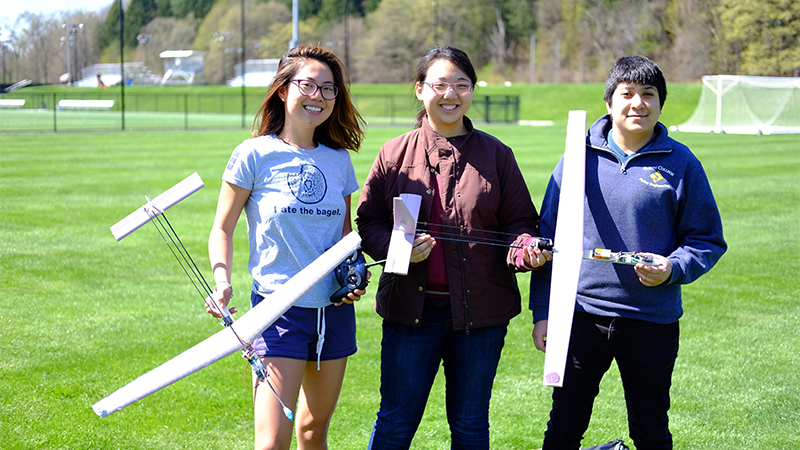Frequently Asked Questions

The Picker Engineering Program engages students in the knowledge and tools of engineering and prepares graduates to be critical thinkers and resilient learners. We foster an inclusive community that welcomes diverse perspectives. Have a question? Contact egradmin@smith.edu.
About Engineering at Smith
The Picker Engineering Program is defined by a foundational and flexible curriculum and teaching approaches that increase diversity, inclusion and equity. The following are some of the most frequently asked questions about the program.
What engineering degrees does Smith offer?
Smith College offers an accredited bachelor of science degree in engineering science (S.B.). The degree is offered for students who are thinking they would like to practice professionally as engineers. The S.B. is an ABET-accredited degree rooted in the fundamental engineering principles that govern all engineering disciplines. After completing a foundational set of core courses, students choose from a variety of electives to pursue an area of technical interest. An integrated curriculum of liberal arts, science, math and engineering courses provides the breadth and depth needed to think critically, act reflectively and make informed decisions.
Can I specialize in one area of engineering?
The challenges of the 21st century require broadly educated engineers capable of working collaboratively and adaptively across disciplinary boundaries. To meet this need, Smith S.B. degree in engineering science provides a strong foundation in the fundamentals of all engineering disciplines. In pursuit of the S.B, students complete five upper-level technical depth courses. These courses, taken at Smith, the College of Engineering at the University of Massachusetts Amherst or elsewhere, enable students to pursue an area of topical or disciplinary interest, such as electrical engineering or sustainable energy. These technical-depth courses are selected in close consultation with the student’s faculty adviser.
What courses should a first-year student consider if they are interested in engineering?
Please refer to our document of specific advice for first-year students.
What AP, IB, A-level exams does the program count towards its requirements?
Please see page 2 of the First Year Advising Resources. If a particular exam is not listed, then it does not count towards the requirements for engineering.
Can I pursue a second major as an engineering student?
In addition to 13 engineering courses, the S.B. degree requires nine courses in the natural sciences, mathematics and computer science. As a result of this curriculum, and our commitment to a liberal education, it’s difficult to pursue a second major in math, computer science or a natural science. Pursuing a second major in a humanities or social science discipline is challenging but doable. For a deep interest in computer science, mathematics or natural science, a student could consider pursuing a minor in one of those areas.
What do S.B. graduates do after Smith?
Smith graduates have a range of choices. Picker Engineering Program graduates can be found across the globe, working in places such as Lockheed Martin, Tesla Motors, AIR Worldwide, Exxon Mobil, Boeing and the Department of Labor. The majority of graduates eventually pursue a graduate degree at places such as Berkeley, Brown, Cornell, Harvard, Dartmouth, John Hopkins and Princeton. The S.B. degree is also considered the first step toward becoming a licensed professional engineer. Undergraduates enrolled in ABET-accredited programs are eligible to sit for the Fundamentals of Engineering (FE) exam, which is the first step in the process. More information about the FE and professional licensure is available at NCEES.
What opportunities are there to study away?
Study abroad is an exciting opportunity, and many engineering majors find programs abroad that offer engineering courses. Because of the required course load, and the time required to become proficient in a second language, most students pursuing the S.B. study either in an English-speaking country or a country for which they already speak the local language.
What is the Princeton Exchange?
Smith College and Princeton University established an engineering exchange program to expose junior year students from both schools to different learning environments. The Princeton Exchange requires an application, due in January of a student’s sophomore year, and accommodates up to two students per year.
What opportunities are there for internships in industry, government or nonprofit organizations?
The Lazarus Center for Career Development connects students with many paid internships and career opportunities. Additionally, Smith’s Praxis program funds students to work at substantive, unpaid summer internships related to their academic or career interest.
In their senior year, S.B. engineering students work in teams on projects sponsored by industry or government through our yearlong Design Clinic. Many of the companies that sponsor design clinic projects also seek students for internships and jobs after Smith.
What opportunities exist for research with faculty?
Individual faculty members often involve students in their research. Students should inquire directly with faculty whose work interests them. Smith’s Summer Research Fellows Program (SURF) provides funding for students to pursue independent research in collaboration with a faculty adviser for 10 weeks during the summer. Two programs, STRIDE and AEMES, provide opportunities for first- and second-year students to work with faculty on research projects. Students are also encouraged to seek out NSF-sponsored REU programs (Research Opportunities for Undergraduates) at other colleges and universities throughout the country.
